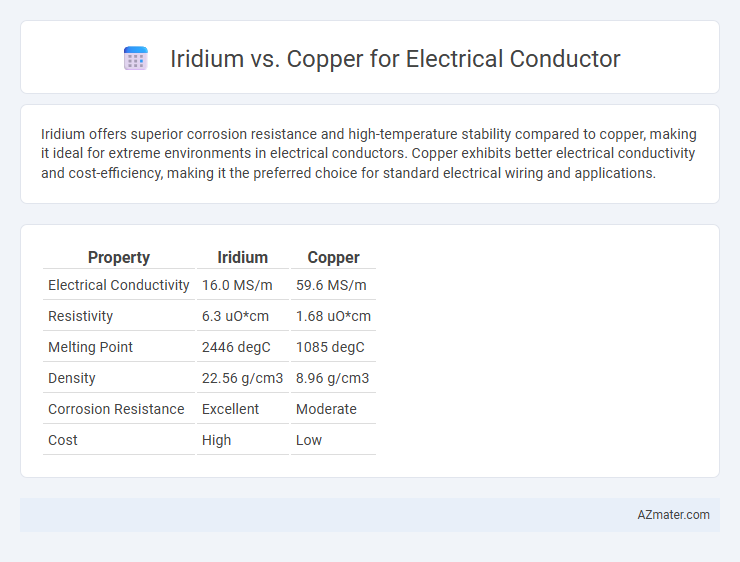Iridium offers superior corrosion resistance and high-temperature stability compared to copper, making it ideal for extreme environments in electrical conductors. Copper exhibits better electrical conductivity and cost-efficiency, making it the preferred choice for standard electrical wiring and applications.
Table of Comparison
| Property | Iridium | Copper |
|---|---|---|
| Electrical Conductivity | 16.0 MS/m | 59.6 MS/m |
| Resistivity | 6.3 uO*cm | 1.68 uO*cm |
| Melting Point | 2446 degC | 1085 degC |
| Density | 22.56 g/cm3 | 8.96 g/cm3 |
| Corrosion Resistance | Excellent | Moderate |
| Cost | High | Low |
Introduction to Iridium and Copper as Electrical Conductors
Iridium and copper serve distinct roles as electrical conductors, with copper being widely favored for its excellent electrical conductivity of approximately 5.96 x 10^7 S/m and cost-effectiveness in general wiring applications. Iridium, a rare and dense transition metal, exhibits lower electrical conductivity than copper but offers exceptional corrosion resistance and durability, making it suitable for extreme environments and specialized electrical contacts. The choice between iridium and copper hinges on balancing conductivity requirements with environmental resistance and longevity in electrical systems.
Electrical Conductivity Comparison: Iridium vs Copper
Copper exhibits significantly higher electrical conductivity, approximately 5.96 x 10^7 S/m, compared to iridium's 1.5 x 10^7 S/m, making it a superior choice for electrical conductors. Iridium's conductivity is roughly 25% that of copper, which limits its efficiency in standard electrical applications. Despite lower conductivity, iridium offers exceptional corrosion resistance and high melting point, favoring niche applications where durability outweighs conductivity needs.
Thermal Conductivity Differences
Iridium exhibits significantly lower thermal conductivity, approximately 147 W/m*K, compared to copper's high thermal conductivity around 401 W/m*K, making copper more efficient at heat dissipation in electrical conductors. This thermal conductivity difference affects the performance of conductors under high current loads, where copper maintains lower temperatures and reduces energy loss due to heat. Iridium's thermal properties, while inferior to copper, provide advantages in extreme environments due to its high melting point and corrosion resistance.
Corrosion Resistance and Durability
Iridium exhibits exceptional corrosion resistance, maintaining stability in highly aggressive environments where copper rapidly degrades, making it superior for applications exposed to harsh chemicals or extreme conditions. Copper, while offering excellent electrical conductivity, tends to oxidize and corrode over time, especially in moist or sulfur-rich atmospheres, which compromises its longevity and performance. The durability of iridium under corrosive stress significantly outweighs copper, ensuring longer service life in critical electrical components despite its higher cost and lower conductivity.
Mechanical Strength and Malleability
Iridium exhibits superior mechanical strength compared to copper, making it highly resistant to deformation under stress, which is advantageous in high-stress electrical conductor applications. Copper, however, offers greater malleability, allowing it to be easily shaped and bent without breaking, an essential property for wiring and flexible electrical components. The balance between iridium's robustness and copper's ductility plays a crucial role in selecting materials based on specific mechanical and manufacturing requirements.
Cost and Availability Concerns
Iridium is significantly more expensive than copper due to its rarity and limited supply, making it impractical for widespread use as an electrical conductor. Copper offers abundant availability and cost-effectiveness, ensuring its dominance in electrical wiring and components. The high cost and scarcity of iridium restrict its use to specialized applications where extreme corrosion resistance and durability are critical.
Industrial Applications: Where Each Metal Excels
Iridium excels in industrial applications requiring extreme corrosion resistance and high-temperature stability, such as aerospace and chemical processing equipment, due to its exceptional durability and resistance to oxidation. Copper dominates in general electrical wiring and power distribution systems thanks to its superior electrical conductivity, ductility, and cost-effectiveness, making it ideal for large-scale electrical infrastructure and consumer electronics. In specialized fields, iridium's sparse availability and higher cost limit its use to niche applications where performance under harsh conditions is critical, while copper remains the preferred choice for everyday conductive needs.
Environmental Impact and Sustainability
Iridium demonstrates superior corrosion resistance and longevity compared to copper, reducing the frequency of replacements and associated resource extraction. Copper production has a significant environmental footprint due to high energy consumption and mining pollution, impacting ecosystems and water quality. Iridium's scarcity and high cost limit its widespread use, but its durability and recyclability contribute positively to sustainability in specialized electrical applications.
Current Research and Technological Developments
Current research on Iridium vs Copper for electrical conductors emphasizes Iridium's superior corrosion resistance and high-temperature stability compared to Copper, which excels in electrical conductivity and cost-effectiveness. Technological developments focus on alloying Iridium to enhance its ductility and exploring nano-structured Copper composites to improve strength and conductivity. Innovations in thin-film deposition and electrodeposition techniques aim to optimize the performance of both metals in advanced electronic and aerospace applications.
Final Considerations: Choosing the Right Metal for Electrical Conductors
Iridium offers exceptional corrosion resistance and high melting points, making it suitable for extreme environments, while copper provides superior electrical conductivity and cost-efficiency for general applications. Copper's widespread availability and ease of fabrication contribute to its dominance in electrical wiring, whereas iridium's use is limited to specialized high-performance components. Selecting the right metal depends on balancing conductivity requirements, environmental conditions, and budget constraints to ensure optimal performance and longevity.

Infographic: Iridium vs Copper for Electrical Conductor
 azmater.com
azmater.com